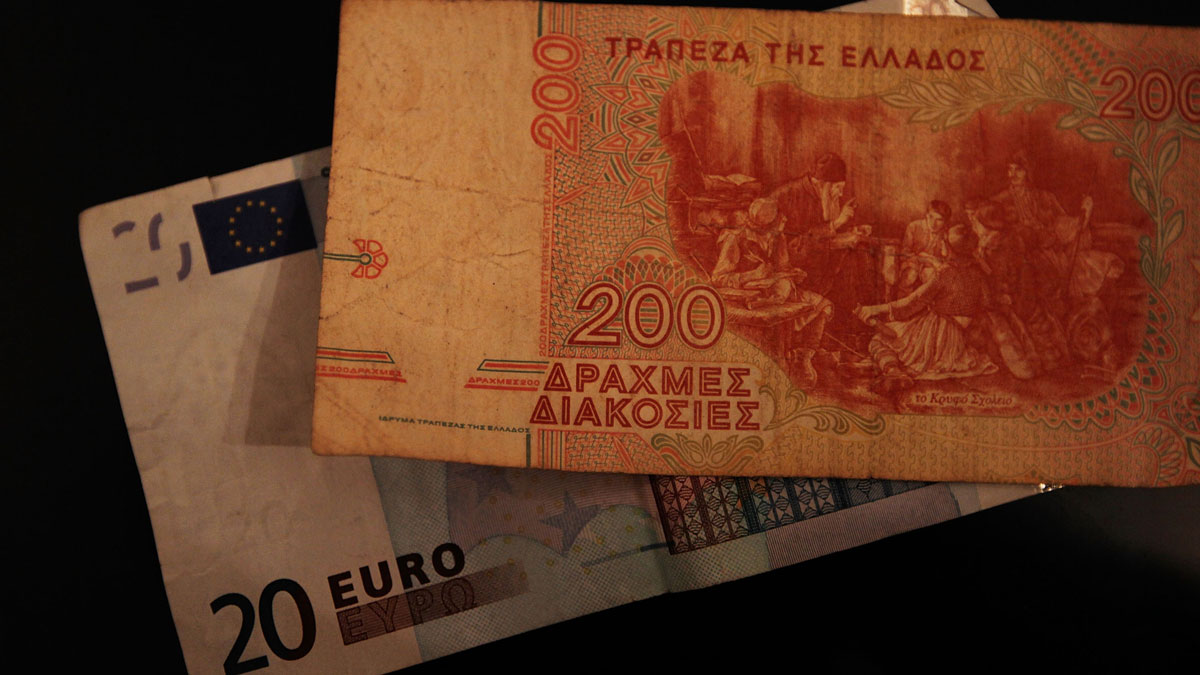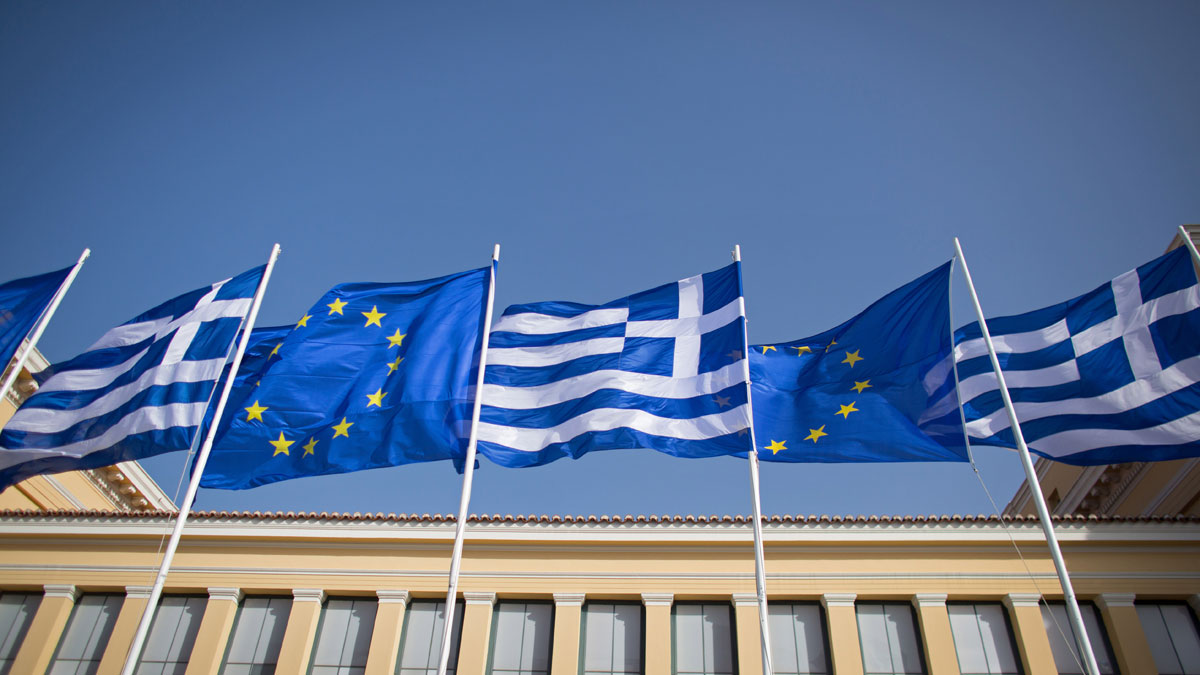Greece finally reaches deal to release €12bn bailout funds
ECB stress tests show country's banks needs €14bn to fill a capital shortfall

A free daily email with the biggest news stories of the day – and the best features from TheWeek.com
You are now subscribed
Your newsletter sign-up was successful
Greece crisis: ECB extends credit line as latest talks stumble
22 June
A credit line allowing Greek banks to meet surging demands from depositors has been extended again by the European Central Bank, as a fresh round of crisis talks looks set to fall short of agreeing a rescue package for the stricken country.
The Emergency Liquidity Assistance (ELA) facility allows banks to create a set amount of money to meet withdrawal requests. Total credit granted under the facility must not exceed an agreed cumulative ceiling and must be signed off by the ECB.
The Week
Escape your echo chamber. Get the facts behind the news, plus analysis from multiple perspectives.

Sign up for The Week's Free Newsletters
From our morning news briefing to a weekly Good News Newsletter, get the best of The Week delivered directly to your inbox.
From our morning news briefing to a weekly Good News Newsletter, get the best of The Week delivered directly to your inbox.
The latest rise is the third in the past six days, as the amount being taken out of the banking sector has surged to €1bn a day, according to The Independent.
Following an increase of €1.1bn last week and a €1.8bn on Friday, the ELA stood at about €85.9bn, says the Financial Times. With €5bn reputed to have been withdrawn last week and requests for a further €1bn logged over the weekend, this has been upped again.
Reuters said the decision was confirmed in a conference call this morning, but that the exact amount has not been disclosed. Conflicting reports have put the latest extension at between €1.3bn and €2bn.
Without the funding, Greek banks would have to resort to the sort of formal capital controls adopted previously by Iceland to prevent a full-on collapse. According to the FT, some banks already have imposed informal restrictions on the amounts that can be withdrawn in cash.
A free daily email with the biggest news stories of the day – and the best features from TheWeek.com
A range of reports suggest that the ELA funding limit may now have to be reviewed on a daily basis, as increasingly rancorous discussions over extending the country's bailout continue.
Greece has to meet a payment of €1.6bn to the International Monetary Fund by the end of the month to avoid a default, which it will not be able to meet without unlocking €7.2bn from its existing bailout which is being held pending agreement on fiscal reforms.
Hopes that talks scheduled between European leaders this evening would break the deadlock were dashed after confusion over apparent concessions being offered by Greece brought an early halt to a meeting of Eurozone finance ministers. The so-called Eurogroup will now meet again later this week.
According to the FT's Patrick Jenkins, Greek banks owe around €35bn to the ECB in direct loans, in addition to credit covered by the ELA, meaning upwards of €120bn in liquidity has been provided in total.
With deposits thought to have fallen as low as €126bn – down from a peak of €235bn before the last liquidity crunch in 2009 – this represents significant latitude from the central bank, one of the 'troika' of creditors with which the country is negotiating.
Greece crisis: endgame looms as emergency summit begins
22 June
Greek Prime Minister Alexis Tsipras is meeting with international creditors and eurozone leaders today in a last-ditch attempt to avoid bankruptcy and an exit from the single currency.
If a deal is not reached at the emergency summit in Brussels, it is increasingly likely that Greece will run out of time to secure €7.2 bn (£5.2 bn) in desperately needed bailout funds before it is due to repay a €1.6bn (£1.1bn) loan from the International Monetary Fund at the end of the month. In a sign that the Greek government is willing to make concessions in exchange for the funds, Tsipras unveiled a new proposal ahead of the summit after months of stalled negotiations. He described his reforms package as "mutually beneficial", but the full details of the proposal have yet to be unveiled. Creditors have been demanding that Athens make a range of controversial economic reforms, including yet more public sector cuts, but the ruling Syriza party has so far said that those terms are unacceptable. Eurozone officials now appear optimistic a deal will be struck, says the Financial Times. Martin Selmayr, the chief of staff of European Commission President Jean-Claude Juncker's, said the new Greek submission was a "good basis for progress." Highlighting the difficulty in reaching a deal that would please both sides, he likened the process to a "forceps delivery". But not everyone shares in his optimism. Other senior officials believe the negotiations have now reached the "end of the road" and are prepared to "let [Greece] go". Fearing the worst, Greek citizens have withdrawn billions of euros in cash in recent days, adding to the pressure felt by the nation's banks.Louka Katseli, the head of the National Bank of Greece, said it would be "insane" not to reach an agreement at the meeting, but that it was unlikely the country would be forced to leave the single currency because the cost would be too high for the rest of the eurozone.
There are now just three outcomes for Greece, says the BBC. No deal is reached and the government defaults on its debt and leaves the euro, a deal is reached at the last minute and it can repay its loan and stay in the single currency, or no deal is reached but both sides "paper over the cracks" and Greece stays in the euro for now.
Greece turns to Russia for help as IMF deadline approaches
19 June
Greek Prime Minister Alexis Tsipras is holding talks with Russian leaders at an economic forum in St Petersburg, after failing to agree to a deal with European creditors.
With the country teetering on the brink of bankruptcy, Russian deputy prime minister Arkady Dvorkovich said Moscow is "ready to consider" offering financial aid to Greece, reports Sky News.
His statement came after European leaders called for an emergency summit to help resolve the Greek debt crisis.
Negotiations between the government and its creditors to secure €7.2 bn (£5.2 bn) in desperately needed bailout funds have stalled. The talks with Russia come less than two weeks before Greece is due to repay €1.6bn (£1.2bn) to the IMF or risk an exit from the eurozone – or Grexit.
The prospect of an alliance between Athens in Moscow is "an audacious attempt" by the Greek government to pressure its eurozone creditors into offering more favourable demands in exchange for the funds, says The Independent.
Relations between Greece and Russia have been warming since the Syriza party came to power earlier this year. "Tsipras has gone to great lengths to accentuate Greece's cultural and historical ties to Russia," said Nicholas Spiro of Spiro Sovereign Strategy.
"Cosying up to Russia is part of his brinkmanship with Greece's creditors. All this adds to fears that if Greece exits the eurozone, Russia is waiting in the wings."
Russia has so far kept itself out of the European financial crisis, but if Vladimir Putin does decide to intervene, "it would transform a five-year economic crisis into a geopolitical one," warns Foreign Policy. Tensions between Russia and the West remained heightened over the ongoing conflict in Ukraine and sanctions imposed by Europe and the US.
Greece nears EU exit: what are the risks for the UK?
18 June
German Chancellor Angela Merkel believes a debt deal with Greece is still possible, as European finance ministers gather for last-minute talks to avoid the country defaulting on its repayments and leaving the eurozone.
"I'm still convinced - where there's a will, there's a way," she told the BBC. "If those in charge in Greece can muster the will, an agreement with the three institutions is still possible."
Meanwhile, the country's central bank has taken the unprecedented step of siding against the government, warning that Greece faces an "uncontrollable crisis" that could force the country out of the EU unless a deal is made, reports the Financial Times.
On a more personal level, Greek prime minister Alexis Tsipras has revealed that his partner has threatened to leave him if he agrees to harsh austerity measures offered by the EU, the International Monetary Fund and the European Central Bank in exchange for bailout funds, says The Times.
Negotiations between the government and its creditors to secure €7.2 bn (£5.2 bn) have stalled, due to the Syriza government's unwillingness to adopt tough new economic reforms. Time is now said to be running out for Greece; it must repay €1.6bn (£1.2bn) to the IMF by the end of June or risk an exit from the eurozone – or Grexit.
IMF president Christine Lagarde has warned that there will be "no period of grace" for Greece, which will be in default if it fails to pay on time.
What would this mean for the UK?
Britain has stepped up contingency plans to prepare for a possible Grexit, with Chancellor George Osborne warning that there was a "very real risk" the negotiations could fail, The Times reports. "People should not underestimate the damage that that would do to financial confidence," Osborne said.
British savers have been warned to expect at least 10 per cent to be wiped off the value of pensions and Isas if Greece goes bankrupt and leaves the single currency, the Daily Telegraph reports. As the deadline looms, one bank has advised clients to sell "all eurozone assets - meaning stocks, bonds and the euro" if a deal is not reached.
The drawn-out period of instability has already had a negative impact on British exports to Europe. "The eurozone is the UK's biggest trading partner, and manufacturers have already reported pressure on orders and sales in recent months," reports The Guardian. An exit from the eurozone would see business and consumer demand plummet even further and Britain would struggle to find new markets to plug the gap as the effect of the crisis would have worldwide ramifications.
Chief European and UK economist at analysts IHS Economics, Howard Archer, said: "We are now in last-chance saloon." He predicts that if Greece were to exit the euro, the impact on Britain and other European nations would be "more contained" than if it had happened two years ago.
"But no one really knows [what the true impact will be] and you can expect a negative reaction in the markets when faced with that kind of uncertainty," he warned.
-
 Political cartoons for February 7
Political cartoons for February 7Cartoons Saturday’s political cartoons include an earthquake warning, Washington Post Mortem, and more
-
 5 cinematic cartoons about Bezos betting big on 'Melania'
5 cinematic cartoons about Bezos betting big on 'Melania'Cartoons Artists take on a girlboss, a fetching newspaper, and more
-
 The fall of the generals: China’s military purge
The fall of the generals: China’s military purgeIn the Spotlight Xi Jinping’s extraordinary removal of senior general proves that no-one is safe from anti-corruption drive that has investigated millions
-
 Majority of Greeks regret joining euro
Majority of Greeks regret joining euroSpeed Read Fifty-three per cent say it was 'wrong' to join single currency - and feeling is strongest among the young
-
 US stock markets fall after Greek vote
US stock markets fall after Greek voteSpeed Read Wall Street slide mirrors falls in Asia and Europe as global 'Grexit' jitters take hold
-
 'Leap' second: how much was it worth?
'Leap' second: how much was it worth?In Depth During yesterday's extra second, Apple earned about twice the average UK weekly salary
-
 Greek crisis: a case of history repeating itself
Greek crisis: a case of history repeating itselfIn Depth If Greece leaves the euro, it won't be the first monetary exit for the Hellenic Republic
-
 Greece crisis: has bailout ended threat of Grexit?
Greece crisis: has bailout ended threat of Grexit?In Depth Economic targets remain ambitious and the political situation is far from settled